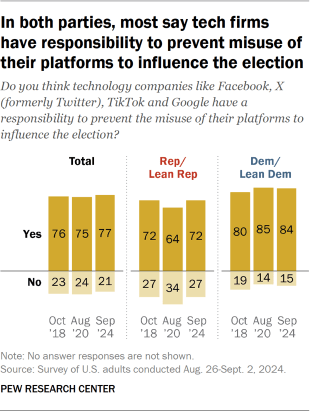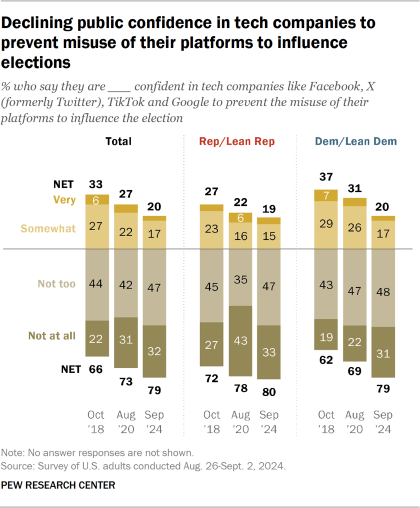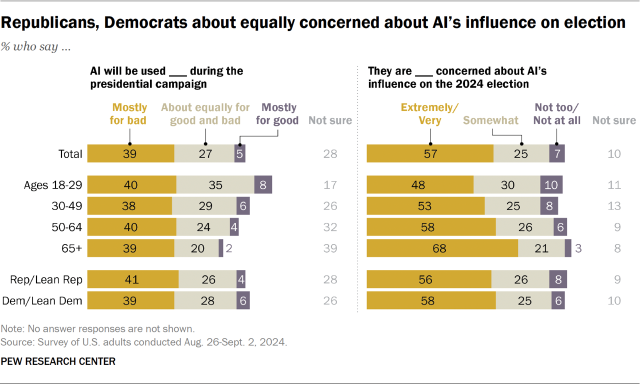Amid growing unease over the role of artificial intelligence in everyday life, a majority of Americans say they are concerned about the impact of AI on the 2024 presidential campaign.
Americans also express little confidence in major technology companies to prevent misuse of their platforms to influence the election.
Pew Research Center conducted this analysis to understand Americans’ views of the influence of artificial intelligence and technology companies on the 2024 presidential election. As part of a larger study, we surveyed 9,720 adults from Aug. 26 to Sept. 2, 2024.
Everyone who took part in this survey is a member of the Center’s American Trends Panel (ATP), a group of people recruited through national, random sampling of residential addresses who have agreed to take surveys regularly. This kind of recruitment gives nearly all U.S. adults a chance of selection. Surveys were conducted either online or by telephone with a live interviewer. The survey is weighted to be representative of the U.S. adult population by gender, race, ethnicity, partisan affiliation, education and other factors. Read more about the ATP’s methodology.
Here are the questions used for this analysis, the topline and the survey methodology.
A new Pew Research Center survey finds:
- 39% of Americans say that AI will be used mostly for bad purposes during the presidential campaign, compared with only 5% who say it will be used mostly for good purposes. Another 27% say it will be used about equally for good and bad.
- A 57% majority of U.S. adults – including nearly identical shares of Republicans and Democrats – say they are extremely or very concerned that people or organizations seeking to influence the election will use AI to create and distribute fake or misleading information about the candidates and campaigns.
How Americans view tech companies’ responsibility during election season
When it comes to major technology companies, 77% of U.S. adults say companies like Facebook, X (formerly Twitter), TikTok and Google have a responsibility to prevent the misuse of their platforms to influence the 2024 presidential election.

However, just 20% say they are very or somewhat confident that these companies will prevent their platforms from being misused, according to the survey, which was conducted Aug. 26-Sept. 2.
The share of Americans who say tech companies bear a responsibility to prevent misuse of their platforms has changed little since 2020 and 2018.
Views by party
Majorities in both parties continue to say tech companies have an obligation to prevent their platforms from being misused. But Democrats and Democratic-leaning independents (84%) are more likely than Republicans and GOP leaners (72%) to express this view.
While Democrats’ views have changed little since 2020, the share of Republicans who now say tech companies have this responsibility is higher than four years ago. In August 2020, 64% of Republicans said tech companies were responsible for preventing misuse of their platforms.
How Americans’ confidence in tech companies has changed over time
Public confidence in tech companies to prevent the misuse of their platforms to influence elections has declined over the last six years.

- Today, just 20% of Americans say they are very or somewhat confident in tech companies like Facebook, X, TikTok and Google to prevent the misuse of their platforms to influence the 2024 presidential election.
- In 2018, a third of Americans said they were confident these companies could do this.
Today, 79% of adults say they are not too or not at all confident that tech companies can stop the misuse of their platforms to influence the election.
Views by party
Majorities in both parties say they are not confident in technology companies to prevent misuse of their platforms. Republicans and Democrats alike have grown less confident since 2018.
- 80% of Republicans and Republican-leaning independents are not at all or not too confident in tech companies to prevent the misuse of their platforms, up from 72% who were not confident in 2018. However, the share of Republicans who say they are not at all confident has decreased since 2020 (33% now, 43% then).
- 79% of Democrats and Democratic leaners say they are not confident in tech companies to stop misuse – an increase of nearly 20 percentage points since 2018, when 62% of Democrats were not confident.
Views of AI’s impact on the election differ by age, not party
Republicans and Democrats largely express similar views of how AI might influence the 2024 election.
- Roughly four-in-ten Republicans (41%) and Democrats (39%) say AI will be used mostly for bad during the 2024 presidential campaign.
- Similar shares in both parties say they are extremely or very concerned about AI’s influence on the election (56% of Republicans and 58% of Democrats).

Adults in all age groups are about equally likely to say AI will be mostly used for bad during the presidential campaign. And relatively small shares in all age groups say it will primarily be used for good.
But younger adults are more likely than older adults to say AI will be used equally for good and bad. Among older people, there is more uncertainty about how AI will be used during the election.
- 35% of adults under 30 say AI will be used about equally for good and bad, while 17% say they are not sure.
- Among those ages 65 and older, 20% say AI will be used about equally for good and bad, while 39% are not sure how it will be used.
Americans ages 65 and older are more likely than people in any other age group to be extremely or very concerned about AI’s influence on the election: 68% say this. Among adults under 30, by comparison, 48% have the same level of concern.
Note: Here are the questions used for this analysis, the topline and the survey methodology.




